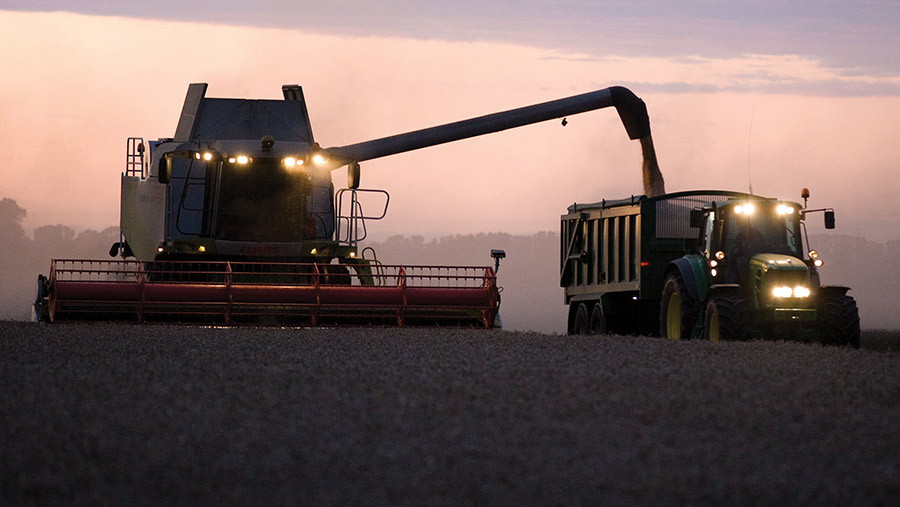Advice on farm staff issues with drug and alcohol use
 © Onephoto/Adobe Stock
© Onephoto/Adobe Stock Employers have a legal duty to protect employees’ health, safety and welfare, and that means taking action if they suspect that an individual is the worse for wear from drink or drugs.
While none of the 27 deaths that occurred on UK farms in the 12 months to 31 March 2023 was linked to drugs or alcohol, a worker with reduced capacity as a result of their use will almost certainly introduce further risk to an already hazardous environment.
See more: Farm recruitment – how to tackle issues around medical history
Natalie Ward, a solicitor specialising in employment at law firm Thrings, says an employer is entitled to a reasonable expectation that employees will come to work fit and able to carry out their job.
That expectation includes performing their duties safely without any limitations caused by the use or after-effects of drugs and alcohol.
Duty of care
Under what is known as the common law duty of care, all employers must take reasonable care of employees.
If an employer allows an employee to continue to work when under the influence of drugs or alcohol, there is, at the very least, a risk that this duty of care may be breached.
If a worker exhibits signs of alcohol or drug taking, the employer can invoke the farm’s disciplinary procedure.
“If the farm’s disciplinary policy or standalone substance misuse policy includes a clause that coming to work while under the influence of drugs and alcohol is a disciplinary matter, the employee will be forewarned that it could be an issue of gross misconduct and, as a consequence, dismissal might result,” says Natalie.
Staff who repeatedly turn up for work with severe hangovers are a risk to themselves and others.
“They may not still be under the influence but they are likely to be tired as a consequence, and that could result in an accident, so the disciplinary policy can apply here too,” she says.
In instances of either a one-off or persistent intoxication, there may be strong grounds for dismissal.
However, the employer must have reasonable grounds for believing that the employee was guilty and to have carried out as much investigation as is considered reasonable.
“It is likely that dismissal could be justified because there is a significant degree of risk given that a farm employee’s duties involve machinery and livestock,” says Natalie.
She advises that an employer must carry out a full investigation before considering disciplinary action, because dependency on illegal drugs and alcohol can sometimes arise out of a disability, such as mental health issues.
Disability considerations
“If dependency or usage arises out of disability then, under employment law, the employee must not suffer unfavourable treatment as a result,” she says.
Workers should be encouraged to make their employer aware if there is an underlying cause for their substance use or dependency.
They should, in the first instance, be supported and directed to specialist advice or occupational health.

Those working with a hangover put themselves and others at risk © Mihail/Adobe Stock
Substance misuse policy
“Farmers should consider having a substance misuse policy, or at the very least update their disciplinary policy, to ensure that employees are aware of their approach and the risks.
“To prevent the risk of drug and alcohol problems on-site, farmers may wish to review their policies and working practices on the farm to ensure their rules and culture encourage a zero-tolerance approach to working while intoxicated, but also a supportive and confidential one where dependency or substance misuse is an issue,” Natalie suggests.
Policies that don’t form part of an employment contract can be amended without consultation with the employees.

There should be a zero-tolerance approach to working while intoxicated © Emile/Adobe Stock
Much has been written about the opioid crisis in rural America. Opioids are drugs that block pain signals in the body and are usually used to treat moderate-to-severe pain.
Reports suggest that as many as 74% of US farmers or farmworkers are – or have been – affected by the misuse of opioids.
Although this is not thought to be an issue in the UK, taking prescription drugs to relieve chronic pain is prevalent among farmworkers due to common repetitive motions, such as kneeling and carrying heavy loads.
Natalie says different approaches should be taken in respect of prescribed drug use and illegal drugs.
Prescribed medication
“If an employee is under the influence of prescribed medication, this will still be of concern to the employer.
“In most farm employment scenarios, heavy, dangerous equipment is being used, and if the operator’s judgment or decision-making is impaired by medication, that does need to be discussed.”
Employers should carry out an investigation to find out how the employee is affected by their medication and conduct suitable risk assessments in relation to the machinery they operate.
This may require consultation with expert health professionals.
An employer will also want to satisfy themselves that there is no misuse of prescribed medication, adds Natalie.
It is not only the safety of the employee and other staff that needs to be considered, but members of the public too, with so much equipment being driven on public roads.

© Sascha/Adobe Stock
Insurance implications
In the event of a claim, insurers may apply a range of penalties if those involved are under the influence of drugs or alcohol, says NFU Mutual.
“These could include reducing payments, avoiding claims payments entirely, or even attempting to recover costs from the intoxicated driver,” says rural affairs specialist Hannah Binns.
Alcohol interlocks on agricultural machinery or equipment, which prevent an engine from starting until it registers a negative breath test from the operator, are becoming more commonplace in the UK, with at least two companies manufacturing these.
With costs ranging from £600-£1,000, including VAT, these devices can provide an extra layer of safety by ensuring that tractors, telehandlers and other farm equipment can only be driven by staff who are fit to operate them.

© PA Images/Alamy Stock Photo
Drug and alcohol testing
A clause that an employee will be subject to periodic drug and alcohol testing can be included in the employee’s contract or in a substance misuse policy.
However, such a provision needs to be carefully considered and justified, Natalie advises.
“It is likely that it could be justified on a farm on health and safety grounds, in respect of those farmworkers who drive or operate machinery as part of their job.”

Drug and alcohol use increase the risk of accidents involving heavy machinery © Tim Scrivener
The employer must have the informed consent of the person being tested – employees cannot be forced to take drug or alcohol tests, but withholding consent could be stated to be an act of misconduct in an employer’s policies.
There are also issues around how the data relating to test results will be stored.
The medical data generated by the results constitutes special category personal data, so advice needs to be taken on how that should be stored to comply with the General Data Protection Regulation.
Employers should have a policy that explains how they will deal with the retention and erasure of that data.
Supply of drugs by staff
Supplying drugs to other members of the farm workforce is also a serious issue.
If an employer knowingly permits the supply of any controlled drugs to take place on their premises, they could be committing an offence under the Misuse of Drugs Act 1971.
Natalie suggests that if an employer is suspicious that supply might be an issue, they must carry out an investigation in the first instance.
They can do this themselves or ask a third party to do it – for larger farm businesses, this might be the human resources department.
“Farmworkers are likely to be somewhat reticent to speak openly about the colleague under suspicion for fear of reprisals, but in this situation an employer has the right to investigate and, depending on the circumstances, that could mean involving the police too.”
The employee suspected of supplying drugs would need to be interviewed as part of the investigation process.
“If everything points to the employee supplying drugs, invoking the disciplinary process and calling the suspected employee to a disciplinary hearing would be the next step,” says Natalie.
Calls to FCN
While not high on the list of calls to the Farming Community Network (FCN) helpline as a stated concern, the charity does receive calls relating to substance misuse.
FCN services manager Mark Thomas says these usually relate to alcohol and occasionally drugs.
A call received this week was from a manager concerned about and wanting to help one of their staff who was a recreational drug user.
